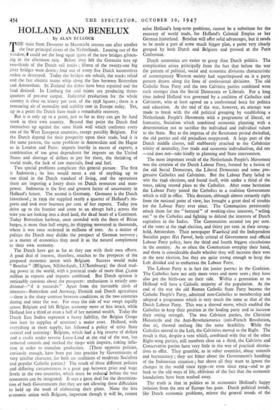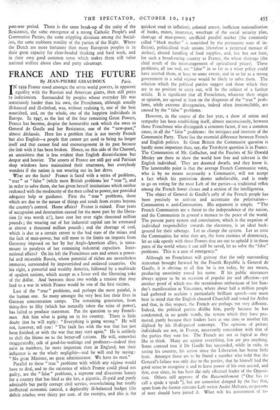HOLLAND AND BENELUX
. By ALAN BULLOCK IV HE train from Deventer to Maastricht crosses one after another I the four principal rivers of the Netherlands. Leaning out of the window,4 could see the long squat spans of the new bridges glisten- ing in the afternoon rain. Before they left the Germans tore up two-thirds of the Dutch rail tracks ; fifteen of the twenty-one big river bridges were down ; four out of every five Dutch locomotives stolen or destroyed. Today the bridges are rebuilt, the tracks relaid and the fast electric trains whip along the line between Rotterdam and Amsterdam. In Zeeland the dykes have been repaired and the land drained. In Limburg the coal mines are producing three- quarters of pre-war output. Industrial production for the whole country is close on ninety per cent. of the 1938 figures ; there is a reassuring air of normality and stability rare in Europe today. Yes, up to a point the Dutch have made a remarkable recovery.
But it is only up to a point, just so far as they can get by hard work in their own country. Beyond that point the Dutch find themselves up against the same blank wall which confronts every one of the West European countries, except possibly Belgium. For the Dutch depend for their prosperity upon their trade, 'and it is the same pattern, the same problems in Amsterdam and the Hague as in London and Paris: imports heavily in excess of exports, a combination of too great dependence for imports on the United States and shortage of dollars to pay for them, the shrinking of world trade, the lack of raw materials, food and fuel.
Two special problems complicate this general picture. The first is Indonesia ; its loss would mean a cut of anything up to one third in the Dutch standard of living, and the operations there are imposing a heavy drain on Dutch resources and man- power. Indonesia is the first and greatest factor of uncertainty in Holland's future. The second is Germany. Germany is the Dutch hinterland ; in 1939 she supplied nearly a quarter of Holland's im- ports and took over fourteen per cent, of her exports. Today you drive up to the frontier and come to an abrupt halt ; across the wire you are looking into a dead land, the dead heart of a Continent. Today Rotterdam harbour, once crowded with the fleets of Rhine barges, is more than half empty, its shipping measured in thousands, where it was once reckoned in millions of tons. As a matter of politics the Dutch may dislike the prospect of German recovery ; as a matter of economics they need it as the natural complement to their own economy.
The Dutch have got as far as they can with their own efforts. A good deal of interest, therefore, attaches to the prospects of the proposed economic union with Belgium. Success would make " Benelux " (BElgium, NEtherlands, LUXembourg) the third trad- ing power in the world, with a potential trade of more than Li,000 million in exports and imports combined. But Dutch opinion is noticeably cautious about the prospects: enthusiasm is strictly con- ditional—" if it succeeds." Apart from the inevitable clash of interests—Rotterdam and Antwerp, Flemish and Dutch agriculture —there is the sharp contrast between conditions in the two countries during and since the war. For once the tide of war swept rapidly across Belgium and left Belgian economy more or less intact, while Holland lost a third or even a half of her national wealth. Today the Dutch East Indies represent a heavy liability, the Belgian Congo (not least its supplies of uranium) a major asset. Holland, with everything in short supply, has followed a policy of strict State control and rationing: Belgium, which had a big reserve of dollars and a credit under reverse Lease-Lend at the end of the war, has removed controls and stocked the shops with imports, risking infla- tion in order to stimulate production. (These opposite policies, curiously enough, have been put into practice by Governments of very similiar character, for both are coalitions of moderate Socialists and popular Catholic parties.) The result of these different policies and differing circumstances is a great gap between price and wage levels in the two countries, which must be reduced before the two economies can be integrated. It says a great deal for the determina- tion of both Governments that they are not allowing these difficulties to hold up the work of elaborating their plans. None the less economic union with Belgium, important though it will be, cannot solve Holland's long-term problems, cannot be a substitute for the recovery of world trade, for Holland's Colonial Empire or her German hinterland. Benelux will offer solid advantages, but it needs to be made a part of some mudi bigger plan, a point very dearly grasped by both Dutch and Belgians and pressed at the Paris Conference.
Dutch economics are easier to grasp than Dutch politics. The complication arises principally from the fact that before the war the pattern of political, social and economic divisions characteristic of contemporary Western society had superimposed on it a party pattern drawn along the lines of confessional divisions. The old Catholic State Party and the two Calvinist parties combined were each stronger than the Social Democrats or 'Liberals. For a long time indeed Holland was governed by a coalition of Catholics and Calvinists, who at least agreed on a confessional basis for politics and education. At the end of the war, however, an attempt was made to break with the old political grouping by establishing a Netherlands People's Movement with a programme of liberal, or humanist, Socialism which combined economic planning with a determination not to sacrifice the individual and individual values to the State. But as the impetus of the Resistance period dwindled, the old parties and old prejudices reappeared. A large part of the Dutch middle classes, still stubbornly attached to the Cobdenite trinity of neutrality, free trade and economic individualism, did not —and does not—take kindly to planning and State intervention.
The most important result of the Netherlands People's Movement was the creation of the Dutch Labour Party, formed by a fusion of the old Social Democrats, the Liberal Democrats and some pro- gressive Catholics and Calvinists. But the Labour Party failed to win the 1946 elections, and found itself, with under a third of the votes, taking second place to the Catholics. After some hesitation the Labour Party joined the Catholics in a coalition Government which is still in office. This decision, although almost certainly right from the national point of view, has brought a great deal of trouble for the Labour Party ever since. The Communists persistently attack them for the "betrayal" of working-class interests, "selling out" to the Catholics and fighting to defend the interests of Dutch capitalists in the Indies. The Communists secured ten per cent. of the votes at the 1946 eleCtion, and thirty per cent, in their strong- hold, Amsterdam. Their newspaper Waarheid and the Independent Socialist paper Het Parool, both critical of Government and official Labour Party policy, have the third and fourth biggest circulations in the country. As so often the Communists overplay their hand, and there is considerable doubt whether they will increase their vote at the next election, but they are quite strong enough to keep the Left divided and to embarrass the Labour Party.
The Labour Party is in fact the junior partnt.r in the Coalition. The Catholics have not only more votes and more seats ; they have also got the birth-rate on their side. Within a generation or so Holland will have a Catholic majority of the population. At the end of the war the old Roman Catholic State Party became the Catholic People's Party, admitted non-Catholics to membership and adopted a programme which is very much the same as that of the Dutch Labour Party. This was a shrewd move, which enabled the Catholics to keep their position as the leading party and to increase their voting strength. The two Calvinist parties, the Christian Historicals and the Anti-Revolutionaries (anti-French Revolution, that is), showed nothing like the same flexibility. While the Catholics moved to the Left, the Calvinists moved to the Right. The result is that, despite a vote which, combined with that of the other Right-wing parties, still numbers dose on a third, the Calvinist and Conservative parties have very little in the way of practical alterna- tives to offer. They grumble, as in other countries, about controls and bureaucracy ; they are bitter about the Government's handling of the Indonesian situation ; but above all they want to ignore the changes' in the world since 1939—or even since 1914—and to go back to the old ways of life, oblivious of the fact that the economic foundations have been washed away.
The truth is that in politics as in economics Holland's happy isolation from the rest of Europe has gone. Dutch political trends, like Dutch economic problems, mirror the general trends of the post-war period. There is the same break-up of the unity of the Resistance, the safne emergence of a strong Catholic People's and Communist Parties, the same crippling divisions among the Social- ists, the same stubborn sterility of the parties of the Right. Where the Dutch are more fortunate than many European peoples is in their great capacity for clear-headed thinking and hard work, and in their own good common sense which makes them still value national welfare above class and party advantage.



































 Previous page
Previous page